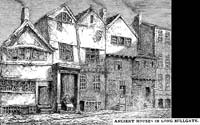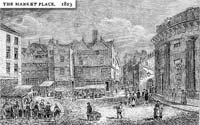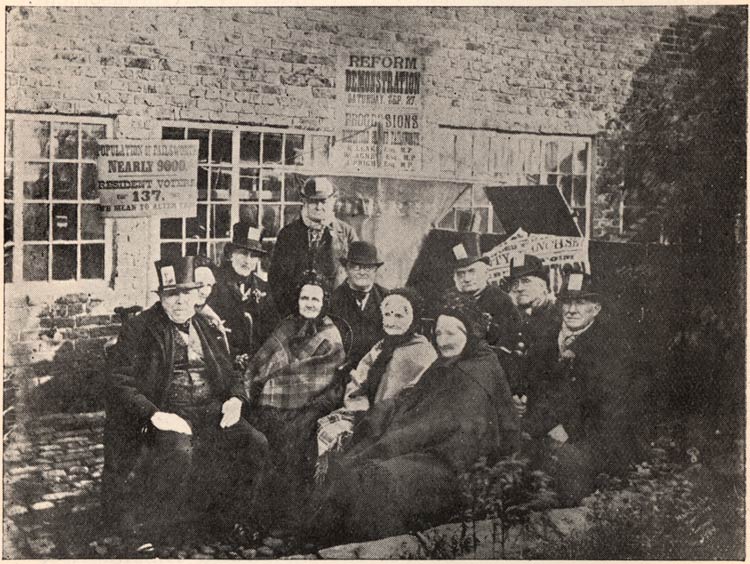
 Long Millgate, Manchester circa 1800 |
'THE PETERLOO MASSACRE'
Monday 16th August, 1819 St. Peter's Field, Manchester. An on-going project towards the 200th Anniversay in 2019 BEFORE ... ON THE DAY ... AFTERMATH |
 Market Place, Manchester in 1823 |
|
27th September, 1884 photograph of Failsworth Veterans of Peterloo, at the 'Great Reform Demonstration' The Reformers are, from the back: |
(From the Oldham Chronicle, November 29th, 1884) If there is one class of people whose company I enjoy more than another it is that of the old and sturdy Reformers who, in dark, bygone days have figured in history and have helped to make it by the part they have played in the noble struggle for the charter of human rights and liberty. There is something strangely fascinating in old age when it has ripened in historic events and associations of nearly a century. It seems as if you were holding converse with the very germ, or the makers of history itself. The present reform agitation suggested to a political friend of mine the idea of entertaining at tea all the Peterloo Veterans now living in the district of Failsworth. A few days since this suggestion was carried out, and by special invitation I was present at the interesting gathering. Eleven of these old veteran Reformers met at my Failsworth friend's house. They were mostly residents of Failsworth, and their ages averaged 82. On meeting the assembled guests I was pleased to find that a prominent member of parliament was also with them as a special guest. He seemed quite at home amongst them, and sat relating incidents he had heard of in connection with the Peterloo massacre. Of these eleven old veterans seven were men and four women. As I sat and gazed at their hoary heads, and wrinkled faces, and trembling forms, and listened to their weak and quivering voices, I could not help but feel moved. The tear of gratitude flowed as I thought of the liberties we now enjoy, and how they had been fought and struggled, aye, and suffered for by these political heroes. The reminiscences of the veterans will perhaps be of interest to many in the present crisis. It was after the hearty singing of the song, "Henry Hunt and Liberty" by one of the aged Reformers, that the patriotic veterans opened their hearts and became communicative by giving vent to their feelings in reference to their persecution in bygone times. The chorus of the song was :- O, God bless Hunt and Wollesley, Addressing the singer when he had done, I asked him if he had a good recollection of the Peterloo event, "Remember it!" he should think he did. He nearly got killed that day. When the yeomanry rushed upon them he made his escape, and took refuge in a cellar, where a lot of his fellow Reformers followed. In the bustle he was thrown down, and trampled on, and badly hurt. It was with great difficulty he got home. "Forget that day! Nay, never while life lasted. There were many horrible things done then that never appeared in the newspapers. There were no free press then." There were more butchers together that day nor he had ever seen since. A few of the Yeomanry were from the district, but they were ever after ashamed of the part they had played. The regular soldiers behaved themselves nobly in comparison to the Yeomanry, and if it had not been for them there there would have been more killed than there were. "Eh! It was a barbarous thing." Here the old man burst out singing a song descriptive of the massacre. The song finished, another veteran commenced to narrate his experience. He lost his hat and shoe in the struggle, and was glad to get away so well. Coming home through Newton Heath some time after the massacre he met a man carrying a bundle of shoes and hats. These he had picked up after the field had been cleared, and with them he was supplying everyone he met who had lost such things. Our narrator said, he tried shoes and hats until he was fitted, and on leaving the hat and shoe distributor he was told by him to tell all who had lost such head and foot gear that they might have any he had that would fit them. That kindhearted soul came from Copster Hill, Oldham, we were informed. The question was asked, "Were there a great many at Peterloo from Failsworth?" an old man answered in the affirmative. Continuing he said, "Amongst the Failsworth contingent there were twenty four young women dressed in white garments." With a touch of deep emotion our informant said he was sorry to say that some of these fair damsels were hurt in the struggle. One of the young women, Mrs. Dunkerley, carried a banner, and had the stave cut out of her hands three times by the Yeomanry. Each time she picked up the banner and cried, "Hunt and Liberty for Ever!" some of those wild and mad Yeomanry were drunken upon their horses. He was told they met in St. James's Square and were made drunken there before they could do their dirty work. He had watched the Tories from 1816, and could remember a time when they kept grain in store at Liverpool until it was spoiled, and the people were nearly starved to death at the time. This was done to get up the prices of the grain. Large quantities were spoiled, and had to be destroyed. Flour was up at 6s. a dozen, and he remembered fetching sixpennyworth in a basin. Wages were low then, and provisions high. What with the press being gagged it was difficult, nay almost impossible, to get any redress. They would not let the nation become wealthy when it might have done. Everything you touched was taxed. They could scarcely stir without being taxed. If they washed their faces the soap was taxed. When they went to the looking glass that was taxed, too. If they even put a clean collar on the very starch that had stiffened it was taxed. In those days they used to fetch thin starch, ready made, from a house , where it was retailed out in a custard form at so much a lump. On being asked how they spent their leisure time then he replied he could hardly tell. He had a distinct recollection of fourteen of them one Christmas day, for want of something better to do, arranging to join at making treacle toffy. But when they came to put their money together they found, to their dismay, that they had not sufficient to purchase a pound of treacle, the price being so high. These were the "good old times" that the Tories were so fond of talking about. At this stage of the proceedings an old dame of 83 promised to sing a song if someone would try to keep her pipe in. The song was commenced, and it was of the usual old fashioned length, about 15 verses. As the singer was finishing her song she observed that the person who had volunteered to keep her pipe lit had become so fascinated with her vocal powers that he had failed in his promise. This drew forth the remark, "Come, John, fire up, fire up, or that pipe will go out." A recitation was next given by a hale old dame of 88 summers, in which a very remarkable feat of memory was shown. Afterwards the old topic of conversation was again resumed. It was asked if any of them had ever suffered imprisonment for their opinions. "Aye, aye." replied a veteran Radical. "I was put in, and was shaved, powd(hair cut), and robbed whilst there." It transpired that the old man had been robbed of the oakum he had picked by a fellow prisoner during a short absence from his work. Another of the veterans said he had a brother arrested and tried for a capital offence. The chief witness against him was a local spy, and if the mean scoundrel had had his own way his brother Ben would have been hung dead. But his brother proved beyond a shadow of doubt that he was in Quebec at the very time he was said to be committing the offence. He was immediately dismissed on the production of this evidence. "Eh, those were hard and trying times," continued the old man. "They could hardly tell who were friends and who were foes and spies." He could mention spies who hid pikes and other arms, and then went with the law officials in search of the arms, and found what they themselves had secreted. There were spies that would have sworn anyone's life away for a sum of money - "blood money" they called it in those days. If they had the newspapers then that they have now such things would not have been tolerated, but the press they had was gagged, and durst not speak out. The old lady singer here chimed in - She could remember going to the White Moss before four o'clock one morning to drill. They had sticks instead of guns. This was only done to frighten Parliament to give them their rights. They never intended fighting. Henry Hunt urged them, before going to Peterloo, to take nothing with them, not even sticks, except they were lame. But she should never forget the scene at Peterloo that day. They never gave them a chance to get away. The drunken Yeomanry came rushing upon them without even waiting until the riot Act was read. They meant to take Hunt with them, come what might. It were both cruel and barbarous to do as they did that day. the regular soldiers behaved themselves like gentlemen compared with the Yeomanry. She believed the attack was arranged days before it was made, as there was not a stone to be found anywhere about. We were informed by another old man that four of his brothers were present at Peterloo. His father, on hearing what had taken place, went to meet his sons. On his way he met several Reformers returning with their faces sprinkled with blood, and amongst the number one man had a tall silk hat cut in two. There was one poor fellow coming through Failsworth bleeding freely from the wounds he had received. He could name three or four Tories, if he liked, who actually came out of their houses and laughed in the face of this wounded and almost fainting Reformer, and told him it served him right. With them party politics were stronger than human sympathy. Fortunately, however, none of his brothers were hurt. This old man also narrated a very interesting incident -. He remembered, shortly after the Peterloo Massacre, standing with his father and a Radical Reformer, best known by the name of 'Billy Quick'. They were near Quick's house, in the old road near Wrigley Head, Failsworth, and were talking about reform, when Billy saw in the distance a number of mounted soldiers approaching. "Those are after me," Billy said. No sooner had he thus spoken than he took off his clogs, and darted quickly across a field, down the valley leading to Moston, and through a culvert. The soldiers joined in the pursuit, but Billy was too 'quick' for them. By dodging and twisting, in the manner stated, he got clear away, and never was captured. The soldiers returned, remarking that they did not call this bold and daring Radical 'Billy Quick' for nothing; he was quick by name and quick by nature. "What had Quick done?" was asked. "Done? Nothing. His crime was daring to be a Radical" Such are a few of the simple and unvarnished incidents related by the Reformers of 1819. What a wonderful change has taken place since those times. Many of the reforms advocated by these hunted down and presecuted veterans have now been secured, They laboured, and we are enjoying the fruits of their labours. We honour and bless them now for having fearlessly done their duty, and for having been, 'persecuted for righteousness sake'. |
